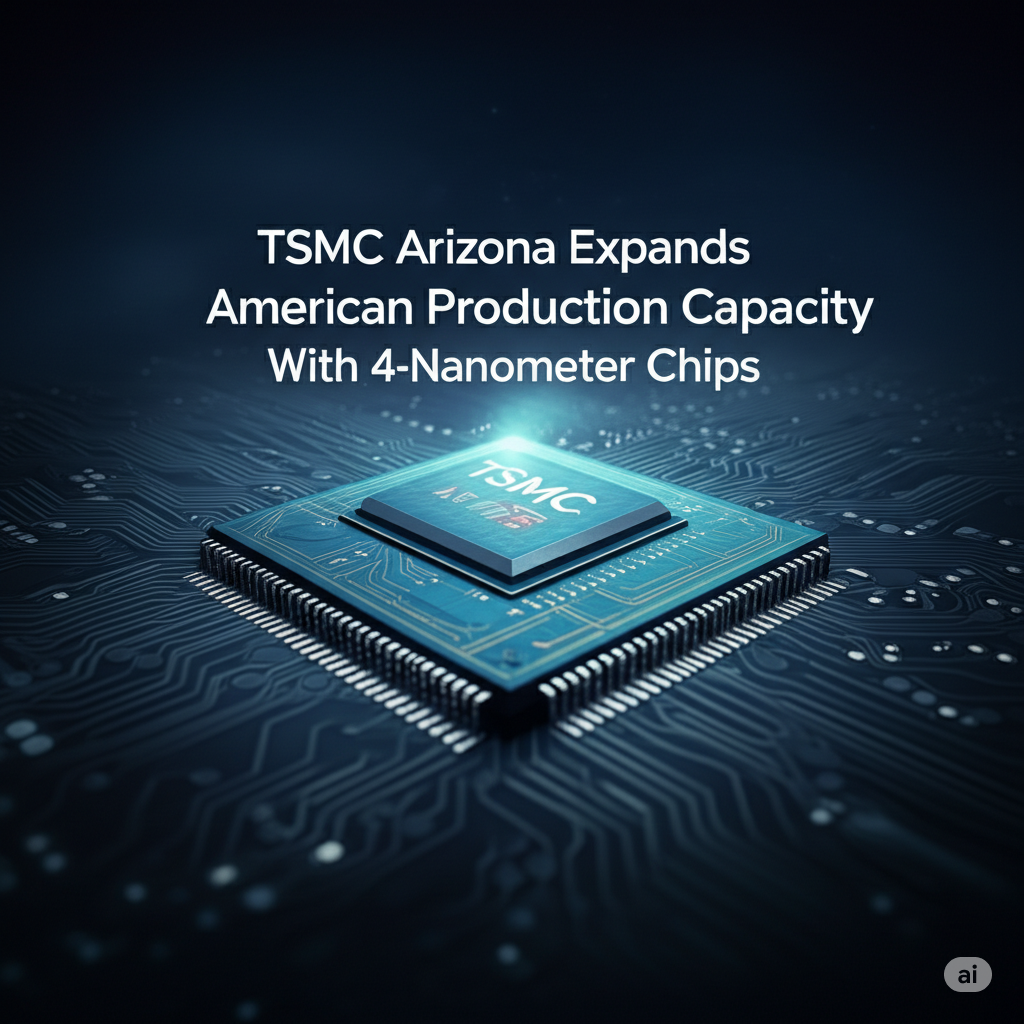TSMC Arizona Expands American Production Capacity With 4-Nanometer Chips
TSMC's Arizona produces advanced 4-nanometer semiconductor chips for the first time on U.S. soil.
Author:Mia ThompsonReviewer:Calvin PenwellMay 08, 20251.5K Shares37.7K Views

In a significant milestone for U.S. semiconductor manufacturing, Taiwan Semiconductor Manufacturing Company has begun producing 4-nanometer chips at its Arizona facility. This development, announced in early January 2025, marks the first time advanced chips at this technology node have been manufactured on American soil.
The new capabilities coincide with the company’s additional $100 billion investment in U.S. semiconductor production, expanding its existing $65 billion commitment in Arizonato a total of $165 billion, the largest foreign direct investment in U.S. history. This expansion includes funding for three new fabrication plants, two advanced packaging facilities, and a research and development center in Phoenix. The initiative aims to diversify TSMC's manufacturing footprint amid geopolitical tensions and aligns with U.S. efforts to bolster domestic chip production and accelerate the AI economy. It’s expected to create 40,000 construction jobs over the next four years and tens of thousands of high-paying, high-tech jobs in the future.
Manufacturing Breakthrough
TSMC Arizona's achievement is a manufacturing breakthrough in multiple ways. The 4-nanometer production process is considered advanced technology in semiconductor manufacturing, with smaller transistors allowing for more powerful and energy-efficient chips. These chipsare destined for use in high-performance applications, including smartphones, artificial intelligence systems, and data centers.
According to industry reports, TSMC's yield rates at its Arizona facility are actually exceeding those at its plants in Taiwan by approximately four percentage points — a significant achievement for a new facility.
The production facility, referred to as Fab 21, is part of TSMC's broader investment in Arizona. The plant currently employs more than 3,000 people working on 1,100 acres of land in Phoenix. This first fab serves as the foundation for TSMC's expanding U.S. manufacturing footprint, which includes plans for additional facilities in the coming years.
Impact On US Semiconductor Production
The production of 4-nanometer chips at TSMC Arizona represents a significant step in rebuilding America's semiconductor manufacturing capacity. For decades, the United States has seen its share of global semiconductor manufacturing decline dramatically — from approximately 40% to just 10% — as production shifted primarily to East Asia.
Former U.S. Commerce Secretary Gina Raimondo set an ambitious goal for the U.S. to produce 20% of the world's leading-edge logic chips by 2030, up from 0% before TSMC began production in Arizona. This target reflects the importance placed on semiconductor manufacturing by the U.S. government, which views domestic chip production as essential for economic competitiveness and national security.
TSMC Arizona's 4-nanometer production capability helps address concerns about supply chain resilience that emerged during the global chip shortages of recent years. According to TechInsightssemiconductor analyst Dan Hutcheson, major customers like Apple have been pushing TSMC to build fabs outside Taiwan to minimize risk, which influenced TSMC's decision to invest in Arizona even before major government incentives were finalized.
Customer Integration and Market Impact
TSMC's American-made 4-nanometer chips are already finding their way into products from major U.S. technology companies. While TSMC hasn’t officially announced all of its U.S. customers, MacDailyNews reports indicate that Apple will be among the first and largest customersfor chips produced at the Arizona facility.
TSMC is producing chips for two Apple products and one for AMD in Arizona, and is in discussions with Nvidia about potentially bringing production of its Blackwell AI chips to the site.
For Qualcomm, another major TSMC customer, the Arizona facility provides valuable geographic diversification. Qualcomm CEO Cristiano Amon has expressed enthusiasm about TSMC's expanded U.S. production, noting that "more capacity that they put we're going to use it, same way we've been using in Taiwan, we're going to use it in other locations.”
Advanced Packaging And Ecosystem Development
Beyond chip fabrication, TSMC Arizona's 4-nanometer production capability is catalyzing the development of a complete semiconductor ecosystem in the region. A critical component of this ecosystem is advanced packaging, which involves assembling and connecting various semiconductor components into finished products. In December 2024, the U.S. Commerce Department finalized a $407 million award to help fund Amkor Technology's $2 billion advanced semiconductor packaging facility in Arizona, which will be the largest of its kind in the U.S.
The Amkor facility will complement TSMC Arizona's chip manufacturing capabilities, providing packaging and testing services for chips used in autonomous vehicles, 5G/6G communications, and data centers. The close proximity of these facilities creates efficiencies in the manufacturing process and reduces dependency on overseas packaging services. According to the Taipei Times, Apple will be the first and largest customer for chips packaged at the Amkor facility that were produced at the nearby TSMC facility.
This integration of manufacturing and packaging will be part of a more complete semiconductor supply chain in the United States. Historically, even when chips were designed in the U.S., they would typically be manufactured in Asia, then packaged and tested in other Asian facilities before returning to the U.S. for incorporation into finished products. The development of both fabrication and packaging capabilities in Arizona should shorten this supply chain significantly.
Future Technology Roadmap
TSMC Arizona's technology roadmap extends well beyond the current 4-nanometer chips. The company's second fab in Arizona, expected to begin production in 2028, will manufacture even more advanced 2-nanometer chips, which will represent the cutting edge of semiconductor technology.
In addition to the 2-nanometer process, TSMC has committed to bringing its most advanced chip manufacturing technology, called "A16," to Arizona. A16 is part of TSMC's next-generation manufacturing process that goes beyond traditional nanometer measurements, incorporating advanced techniques like backside power delivery and other innovations that further improve chip performance and efficiency.
This technology roadmap has set TSMC Arizona on a path to remain at the forefront of U.S. semiconductor manufacturing for years to come. The commitment to bring these advanced technologies to the U.S. demonstrates TSMC's long-term vision for its American operations, ensuring that the most advanced chips powering tomorrow's technologies can be "Made in U.S.A."

Mia Thompson
Author
Mia Thompson is a versatile writer at Kansas Press, delving into a range of topics including news, spiritual exploration, astrology, and numerology. With a passion for delivering insightful and informative content, Mia's articles provide readers with valuable perspectives and thought-provoking insights into these intriguing subjects.
She is dedicated to creating content that resonates with readers and fosters a deeper understanding of complex topics.

Calvin Penwell
Reviewer
Since diving into numerology in 1997, my path has been marked by extraordinary encounters and insights. A pivotal moment was uncovering a forgotten numerological manuscript in a tucked-away Italian library, which deepened my connection to the ancient wisdom of numbers. Another transformative experience was a meditation retreat in Nepal's tranquil mountains, where I honed my intuition and the art of interpreting numerical vibrations.
These adventures have not only enriched my numerological practice but also my ability to guide others towards understanding their destiny and life's purpose. My approach is deeply personal, rooted in a blend of historical knowledge and intuitive insight, aimed at helping individuals find their alignment with the universe's abundant energies. My mission is simple: to share the power of numerology in illuminating paths to abundance and fulfillment.
Latest Articles
Popular Articles